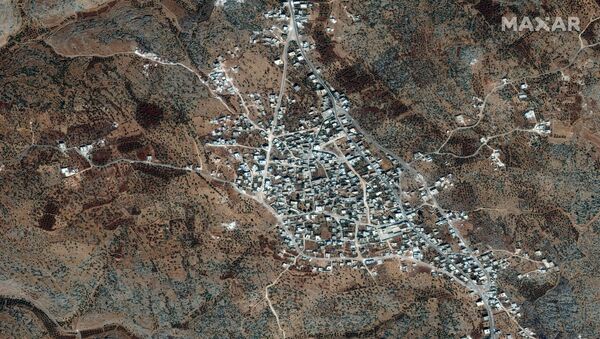After spending his morning at Trump National Golf Club, the president returned to the White House Sunday afternoon and posed for a couple pictures with his staff in the Situation Room before issuing an address to the American people concerning the US military’s recent operation and the death of Baghdadi.
Last night, the United States brought the world's number one terrorist leader to justice. President @realDonaldTrump addresses the death of Abu Bakr al-Baghdadi, the founder and leader of ISIS. Full remarks: https://t.co/3ucibNVOU8 | More: https://t.co/b4fBx9qyY6 pic.twitter.com/odrheyNRtc
— Department of State (@StateDept) October 27, 2019
Mark Sleboda, an international affairs and security analyst, joined Radio Sputnik’s Loud and Clear on Monday to dissect Trump’s account of the Daesh leader’s death and dig into the details surrounding the special forces operation.
“He obviously intends to sit on Syria’s oil after multiple withdrawn promises to withdraw occupation forces from Syria,” Sleboda told hosts Brian Becker and John Kiriakou. “He’s now intent on sitting on Syria’s oil, and the Russian Ministry of Defense has gone so far as to say that the US is actually already involved in oil smuggling.”
Speaking on the satellites images published Saturday by the Russian Defense Ministry, Maj. Gen. Igor Konashenkov described the US’ lingering presence in Syria and subsequent refortification around oil-rich fields in al-Hasakah Governorate as "international state banditism.”
One company brought up by Konashenkov was the US-controlled “Sadcab” (also known as “Sedcab”). Although created with the support of the local Kurdish community, the profit funds line the pockets of US-affiliated intelligence services and military contractors.
Sleboda expounded on the defense official’s point, noting that the US’ proceeds from the oil smuggling are being used to back Washington’s “black and military ops … in the region.”
Oil aside, the analyst likened Trump’s embellished speech and claims of Baghdadi whimpering and crying to former Secretary of State Hillary Clinton’s 2011 “we came, we saw, he died” comment concerning former Libyan leader Muammar Gaddafi.
As for the raid itself, Sleboda found a number of interesting things related to the raw details of the nighttime operation.
He first pointed out that Baghdadi was killed in Idlib, which is located in northwest Syria - “a territory even the Western press acknowledges is controlled almost entirely by al-Qaeda,” an entity historically hostile to Daesh.
“This is odd that Baghdadi would flee to Idlib, [which is] controlled by what are now his enemies,” he contended, seeing as how there is something of a competition to be the “top dog of the jihadist groups.”
Furthermore, the Daesh leader was killed just five miles from Syria’s border with Turkey.
“To get there, Baghdadi would’ve had to cross a lot of hostile territory. Territory controlled by Kurds, by Americans, by Turkish-backed militants, by the Syrian government and Russia,” Sleboda said. “Or, of course, he could’ve just taken a bus into Turkey and back through, considering the porous nature of the Turkish border that [President Recep Tayyip] Erdogan has had with Idlib and their supplies,” such as “oil and other resources.”
He went on to highlight that it can be presumed that Washington did not trust Erdogan, as the military operation was carried out not from the US’ NATO ally Turkey, but instead from Erbil, Iraq, which forced troops to go through “lots of hostile territory and airspace in Syria.”




